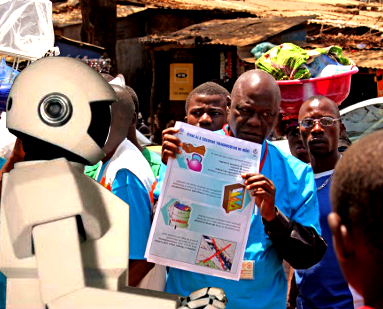Tech world forms new front to fight Ebola
 The tech world is looking to aid the fight against Ebola, as the outbreak nears its 5000th fatality.
The tech world is looking to aid the fight against Ebola, as the outbreak nears its 5000th fatality.
Robots and social media could soon be turned into weapons of mass compassion, as experts figure out how to help sick and disenfranchised people suffering in one of the poorest parts of the world.
13,268 people had been infected with Ebola across eight countries in West Africa, 4,960 of which have died, according to the World Health Organization.
Now, Facebook says it will help the fight with an injection of funds and information.
The social media network says it will boost awareness through updates and posts about the outbreak, taken from UNICEF.
A new button has been introduced on the top of Facebook’s news feed page, allowing an easy way for its 1.23 billion users to donate.
The button allows users to select one of the three charities dedicated to fighting Ebola; Save the Children, International Medical Corps and the International Federation of Red Cross and Red Crescent Societies.
Facebook founder Mark Zuckerberg has already donated $25 million to efforts to develop a cure for Ebola.
Also, engineers from America's top robotics universities have gathered at the White House to discuss the chance of using robots to aid healthcare workers.
While it sounds like a pretty way-out plan, there are a number of advantages to using non-biological helpers in quarantine situations.
Given that Ebola is spread through contact with bodily fluids, experts say putting a robot in the most infected zones in West Africa will keep healthcare workers “out of harms' way”, Ken Goldberg, a Professor of Engineering from the University of California Berkeley, said.
Healthcare workers could be trained to manoeuvre the robots via remote-control, keeping a safe distance from the Ebola-infected person.
The ‘bots can lift the body of a dead person, insert IV lines and even decontaminate hospital rooms.
“Some workers report having 3 inches of sweat accumulated in the bottom of their boots. When you're working that hard for that long it's nice to have a buddy to help or a robot,” Doctoral Candidate Velin Dimitrov from the Worcester Polytechnic Institute told reporters.
It is not the first time robots have been used in times of human crisis - Japan employed similar units in the aftermath of the March 2011 Fukushima earthquake and tsunami, helping remove rubble and scan for survivors.








 Print
Print